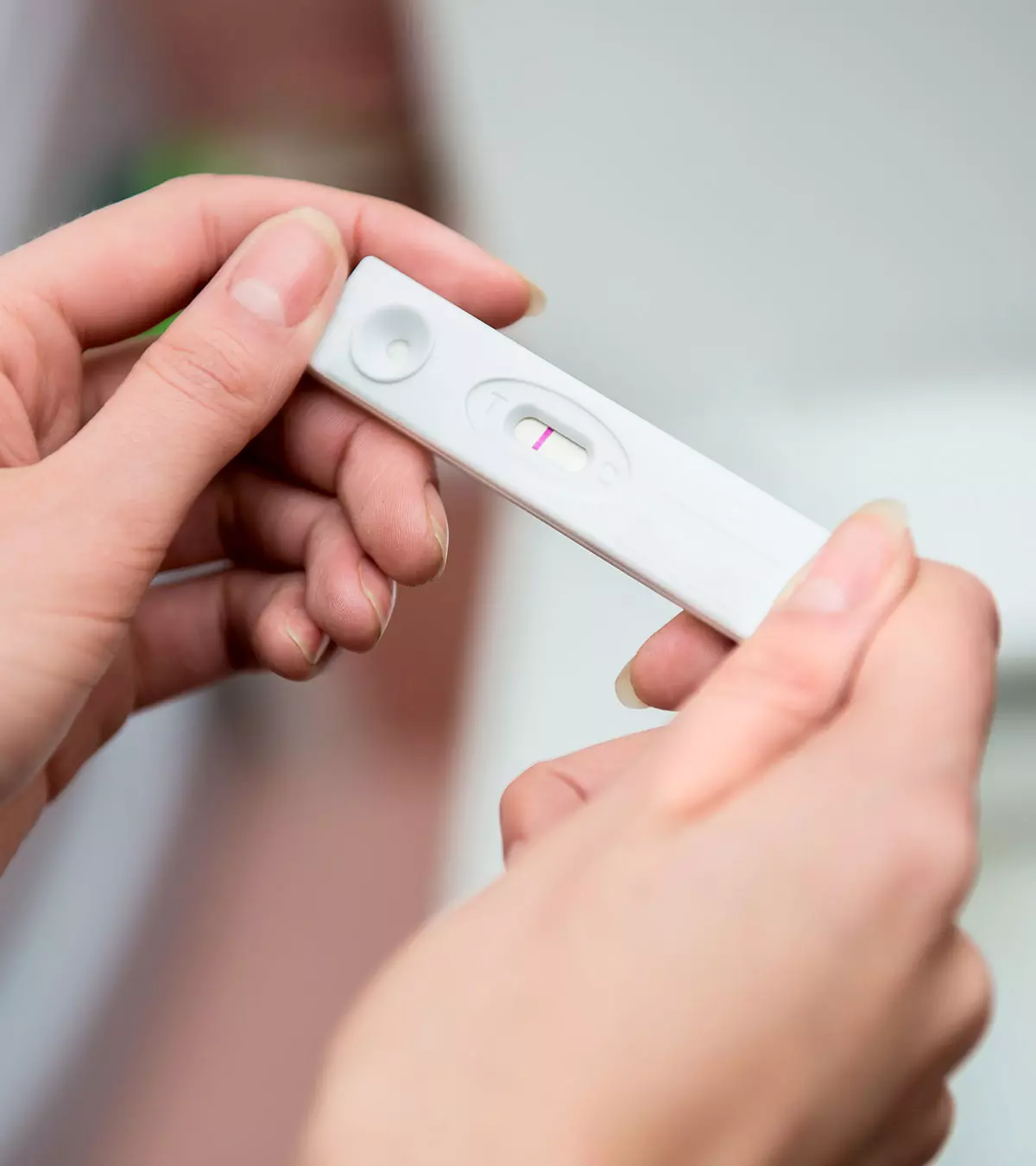
Image: Shutterstock
If you are a first-time mom-to-be, witnessing white vaginal discharge during pregnancy may raise concerns. Even though others may have told you that it only appears in the first few weeks and will disappear afterward, you cannot help but worry.

It is normal to be extra careful and skeptical about even the slightest changes during pregnancy out of concern for your baby. In addition, complications such as a miscarriage or other pregnancy-related problems may have crossed your mind. But do not worry. As long as the vaginal discharge is not accompanied by any other problems or side effects, it should not be considered an alarming situation during pregnancy.
To help you better understand this condition, we have gathered all the required information about it. In this post, we explain the causes, significance, and management of normal and abnormal vaginal discharge during pregnancy and when it may require medical attention. In addition, we have answered some frequently asked questions about vaginal discharge in pregnancy.
Key Pointers
- White milky discharge helps remove bacteria and dead cells and keep the reproductive organs clean.
- Increased levels of estrogen and blood during pregnancy causes an increase in white discharge that is usually clear to white, milky, and odorless.
- Infection, accompanied by symptoms such as itching, a strong or fishy odor, or a change in color are indications of abnormal discharge.
- Abnormal white discharge can be caused by antibiotic use, cervical cancer, diabetes, use of scented products, pelvic inflammatory disease, or poor hygiene.
Why Does White Discharge Happen In Women?
White milky discharge is a fluid made inside the cervix and vagina to flush out the bacteria and dead cells. It keeps the female reproductive parts clean, and prevents infection. Therefore, the discharge is like a cleansing lotion for your private parts. Now, you might wonder if the discharge continues even during pregnancy.
Why Do Women Have White Discharge During Pregnancy?

White discharge is as common during pregnancy as it is around your period time.
During pregnancy, the discharge increases because your body produces more estrogen, and more blood flows into the pelvic area triggering the mucous membranes. The clear-to-white discharge is made up of cervical and vaginal secretions, old cells, and vaginal bacteria.
- Also, as your baby’s head presses against the cervix, the pressure could increase the flow in the later stages of pregnancy.
- The cervix and the vaginal walls become softer, and send out the white thing to prevent the infections entering the womb via the vagina. It means, the discharge is, in a way protecting the little life growing inside you. So, you wouldn’t mind having that white, wet matter troubling you!
When Is White Mucus Discharge Normal During Pregnancy?
White discharge during pregnancy is normal if it looks clear, is thin and milky, and has a mild smell.
Eric Grossman, obstetrician and gynecologist at non-profit health systems provider Virtua, says: “Nearly every pregnant woman is going to experience this. It can be annoying, but it’s not dangerous or bad .”
The normal discharge, called leucorrhea, is similar to the one women have when they are not pregnant.
For many women vaginal discharge increases when they are pregnant, and it becomes thicker in the later stages of pregnancy. At the end of the gestation, the discharge can contain thick mucus and some blood (1) as the body prepares for the birth of the baby.
But you have to worry if white discharge becomes abnormal.
What Does Discharge Look Like During Pregnancy?
Before we go to abnormal discharge, it will be useful to know the various types of discharge and what they mean.
- White milky discharge: As mentioned above, white creamy discharge is the most normal. It could signify ovulation or be an early sign of pregnancy.
- Thick white discharge: The discharge may be thick in some pregnant women, and there is nothing to worry about it. If you are not pregnant, the discharge thickens as your cycle progresses, and the mucous could become thick just before your period starts.
- Thick white clumpy discharge: The discharge can signal toward an infection if it resembles cottage cheese and is clumpy.
Vaginal discharge during pregnancy
is fine as long as it is white in color and odorless.
But if it is in any other color or smell and is accompanied by itching, then it may not be normal.
| Normal | Abnormal |
|---|---|
| White in color, can be thin or thick | Is in different colors such as yellow, green, and brown |
| Odorless or mild odor | Strong or fishy smell |
| Usually harmless for the mother and the baby | Indicates an infection, which could have complications for the mother and the baby |
| Does not require medication | Requires antibiotics |
Abnormal White Discharge During Pregnancy And What Does It Indicate?
Vaginal discharge is abnormal if:
- It is yellow, green or brown in color
- Has a strong or fishy odor
- Your vagina turns red or itchy
Abnormal discharge usually indicates an infection
- Cottage cheese like discharge with smell, irritation and itching may signify yeast infection or candidiasis. An overgrowth of fungus causes this common infection. According to the Centers for Disease Control and Prevention records, vaginal candidiasis is one of the significant causes of outpatient visits in the United States, with an annual prevalence rate of 1.4 million. According to Dr. Grossman, around one in four women will have vaginal yeast overgrowth during pregnancy but it does not harm the baby. While there are over-the-counter medicines for the infection, avoid using them during pregnancy. Instead seek your doctor’s advice.
 Quick fact
Quick fact- White, gray or yellow color discharge with fishy smell can be a symptom of bacterial vaginosis. The condition happens due to the overgrowth of anaerobiciExisting in the absence of oxygen. bacteria in the place of lactobacillary floraiLactic acid-producing bacteria present in the mucosa of the mouth, gastrointestinal tract, and female genitourinary tract. . The infection is reported in 10 to 40% of pregnant women and could cause preterm labor, premature birth, and amniotic fluidiA liquid in the amniotic sac that surrounds and protects the fetus in the womb during pregnancy. infection among others (2).
- Brown discharge can imply miscarriage or ectopic pregnancyiA life-threatening form of pregnancy where the egg fertilizes on the fallopian tubes rather than the uterus leading to blood loss. , where the pregnancy occurs outside the uterus. It is a life-threatening condition for the mother and needs to be removed immediately. Brown discharge may also happen if the cervix is irritated during sexual intercourse or a medical checkup. In this case, it is perfectly normal.
- Yellow or greenish discharge with a foul smell may indicate trichomoniasis. According to studies, up to 25 million pregnant women are infected with trichomoniasisiA common sexually transmitted infection caused by a parasite. (3). The sexually transmitted infection may increase the chances of premature delivery and low birth weight in the newborn (5).
 Be watchful
Be watchful- Cloudy or yellow discharge may signify gonorrhea, a sexually transmitted disease. Also called the clap, it can cause morbidity in women (6).
| Color/ texture of the discharge | Infection | Complications |
|---|---|---|
| Cottage cheese-like with smell | Yeast infection | Does not harm the mother or the baby |
| Gray or yellow with smell | Bacterial vaginosis | Preterm labor, premature birth, and amniotic fluid infection |
| Brown | Miscarriage or ectopic pregnancy | Ectopic pregnancy is life-threatening to the mother |
| Yellow or green | Trichomoniasis | Premature delivery and low birth weight |
| Cloudy or yellow | Gonorrhea | Infection passes to the baby, causing eye infections, pneumonia, or infections of the joints or blood |
During the early weeks of pregnancy, get a screening test done for any sexually transmitted infections, because it is one of the most common causes of abnormal vaginal discharge during pregnancy. But can the discharge be caused due to any other reasons?
Causes Of Abnormal Discharge During Pregnancy

Abnormal vaginal discharge can also be a result of:
- The use of antibiotics
- Cervical cancer
- Diabetes
- Use of scented soaps, bubble bath, etc
- Pelvic inflammatory disease
- Poor hygiene
What To Do In The Case Of Abnormal Discharge?

Sometimes, abnormal discharge might be harmless. But you cannot take a risk as it could also be pointing towards a health condition. Therefore, do not try to cure it through self-medication. Visit a doctor for professional advice, and follow the medication prescribed by them.
Diagnosis and treatment

The doctor would ask you some questions on your sex life, color and smell of the discharge, when it began, etc. They might perform a pelvic examination to check the external genital area. A speculum would be inserted to observe the vaginal walls and cervix.
The healthcare provider might also collect the discharge sample to examine it under the microscope and for a culture test.
Once the tests confirm an infection, you would be prescribed antibiotics that are safe to use during pregnancy.
However, along with medication, there is something else you need to do to avoid any embarrassment, or uneasiness in your panty.
How To Deal With Normal And Abnormal White Discharge?
White discharge, whether normal or abnormal, can be irritating as it flows throughout the day – be it at work, home, or a party. You can avoid that feeling of the ‘flow’ by following these tips:
- Keep the vaginal area clean. Do not use scented soaps in an attempt to control the odor. Plain water can do the job for you.
- Wear pads or panty liners so that you do not feel the wetness, especially during excessive white discharge. The pads/ panty liners absorb the discharge, keeping you dry and clean.
- Do not use tampons because the bacteria that sits on their surface might enter your body through the vagina.
- Say no to douches as they can alter the natural bacteria in your vagina, leading to infections. Also, if air passes into your vagina during the douching process, it could prove to be dangerous.
- Wear cotton and breathable underwear. Avoid tight clothing.
- Keep your genitals dry – wipe them softly from front to back.
- Do not use any scented products such as soaps, pads, toilet paper or sprays.

- Follow safe sex practices like using a condom.
- Add probiotic foods, such as yogurt, in your diet to build up the good bacteria.
If the discharge is due to an infection, the first thing you should do is to see a doctor. You may follow the above measures while taking the medication regularly.
White discharge during pregnancy is not a cause of worry. As long as it is white, odorless and not itchy or painful, you can ignore it as another sign of pregnancy. Take care of your hygiene and use panty liners if the flow is high.
But what you should definitely do is to monitor the texture, color and the smell. If you observe anything wrong with them, see your doctor immediately.
As we have comprehensively covered about white discharge during pregnancy, let’s now answer some questions that our readers have been asking us frequently.
Frequently Asked Questions
1. Is white discharge a sign of ovulation?
White discharge or cervical mucus can actually help you to get pregnant. The nature and quantity of the mucus fluctuates throughout your menstrual cycle. It increases during ovulation as the levels of the pregnancy hormone estrogen surge. During ovulation, the discharge is clear and stretchy and has a consistency of egg whites. Having enough egg white mucus will increase your fertility.
Observe and track your mucus throughout your menstrual cycles to notice the change during ovulation. You may have unprotected sex during this time to get pregnant.
2. Is having white discharge an early sign of pregnancy?
Yes. The look of your discharge changes when you conceive as it becomes thicker, heavier or gummy. You can notice it almost immediately after you get pregnant as the vaginal walls thicken and increase the growth of cells to prevent any infections.
If you observe thick or milky white discharge around the time of your missed period, then it most probably is an early sign of pregnancy. White discharge along with nausea, tiredness and a missed period indicates pregnancy.
However, not every woman has vaginal discharge during the early days of pregnancy. Therefore, you might still be pregnant in its absence.
3. Can I have white discharge before period?
Cervical mucus before period is normal and is part of the flow during your menstrual cycle. The discharge depends on the hormone levels in your blood. You do not have white discharge after period as your vagina is almost dry; later it secretes white thick discharge, which eventually becomes softer and turns into liquid discharge. During ovulation, it turns into egg white color, and just before your period, white discharge becomes thicker.
4. What does white discharge mean during the third trimester?
It does not necessarily mean anything as long as the discharge is normal. However, if it smells or changes color, it could indicate an infection. If there is a sudden gush of watery discharge during pregnancy in the third trimester, then it could mean that your waters have broken and amniotic fluid is leaking. You need to rush to the doctor immediately. Your doctor might try to delay your labor through medication.
5. How can I differentiate between vaginal discharge and mucus plug?
Mucus plug is a protective barrier formed in the cervical canal during early pregnancy. While white discharge could happen throughout your pregnancy, discharge of mucus plug could be an early sign of labor. Mucus plug is expelled as the cervix thins out and opens up for the delivery. The plug looks similar to egg white or the mucus from the nose. It can sometimes look light red or brown as it mixes with blood before labor.
6. Is amniotic fluid similar to vaginal discharge?
No. Amniotic fluid is clear or yellowish and is like your urine. It is usually odorless or has a slight sweet smell. Amniotic fluid floods out when the water breaks and that is one of the biggest signs of labor.
Having white vaginal discharge during pregnancy is completely normal as it prevents vaginal infections. While it normally appears as a clear, thin, milky discharge with a moderate odor, it might thicken and even contain blood as the pregnancy progresses toward birthing. However, if the vaginal discharge has a different color, smells strong, or itches, it might indicate a vaginal infection. Poor hygiene might be the underlying cause in such cases. Therefore, practice good hygiene, avoid wearing tight clothing, and include probiotic foods in your diet. Consult your Ob/Gyn if you have any discomfort along with signs of abnormal discharge.
Infographic: Ways To Improve Vaginal Health When Pregnant
Taking care of your vaginal health can help prevent infections and vaginal discomfort while pregnant. Read through this infographic that speaks about the foods and tips that could aid in boosting your vaginal health. Illustration: Momjunction Design Team
Illustration: Vaginal Discharge During Pregnancy: Reasons & How To Deal

Image: Stable Diffusion/MomJunction Design Team
Pregnancy brings many changes, including vaginal discharge. Take a look at this video to learn more about the types and colors of vaginal discharge. Get a brief idea about the various smells that vaginal discharge may have and visit your doctor.
References
- Vaginal discharge in pregnancy, NHS.
https://www.nhs.uk/pregnancy/related-conditions/common-symptoms/vaginal-discharge/ - J A McGregor and J I French; (2000); Bacterial vaginosis in pregnancy.
https://pubmed.ncbi.nlm.nih.gov/10804540/ - Nonkululeko Mabaso and Nathlee S. Abbai; (2025); A review on Trichomonas vaginalis infections in women from Africa.
https://www.ncbi.nlm.nih.gov/pmc/articles/PMC8377975/ - Lynne M Smith et al.; Trichomonas vaginalis infection in a premature newborn.
https://idp.nature.com/authorize?response_type=cookie&client_id=grover&redirect_uri=https%3A%2F%2Fwww.nature.com%2Farticles%2F7210714 - Sanusi Mohammad Ibrahim et al.; (2016); Management of abnormal vaginal discharge in pregnancy.
https://www.intechopen.com/chapters/49986 - https://www.nct.org.uk/information/pregnancy/body-pregnancy/vaginal-discharge-during-pregnancy-your-questions-answered
https://www.nct.org.uk/information/pregnancy/body-pregnancy/vaginal-discharge-during-pregnancy-your-questions-answered - https://familydoctor.org/condition/vaginal-discharge/
https://familydoctor.org/condition/vaginal-discharge/
Community Experiences
Join the conversation and become a part of our nurturing community! Share your stories, experiences, and insights to connect with fellow parents.
Read full bio of Dr. Neha Singh
Read full bio of Rebecca Malachi
Read full bio of Swati Patwal
Read full bio of Dr. Joyani Das
















